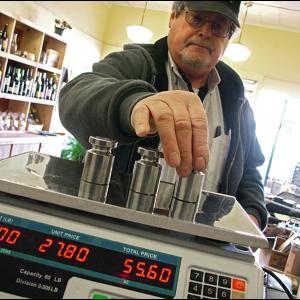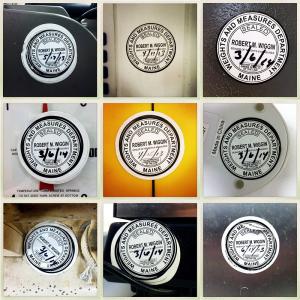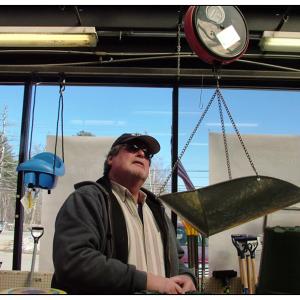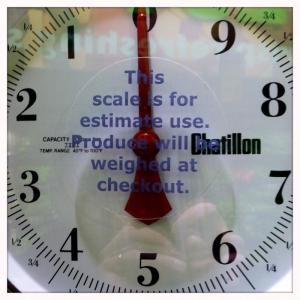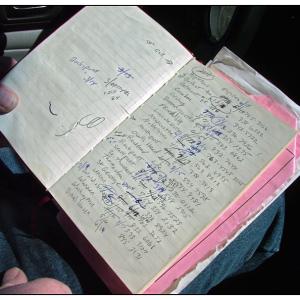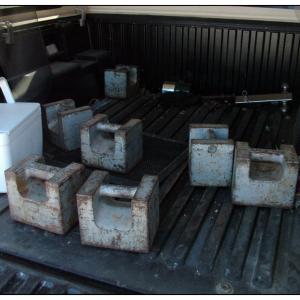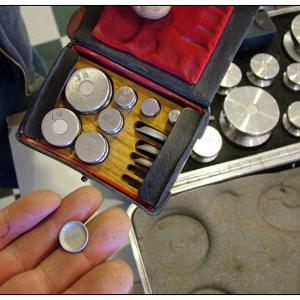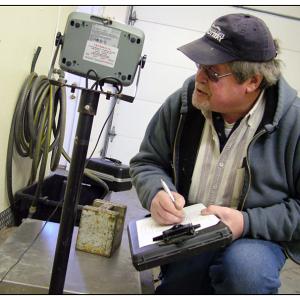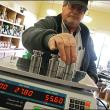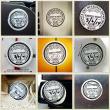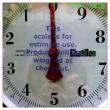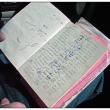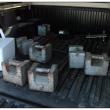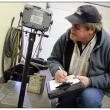The Midcoast’s checker of scales and pumps gets to work
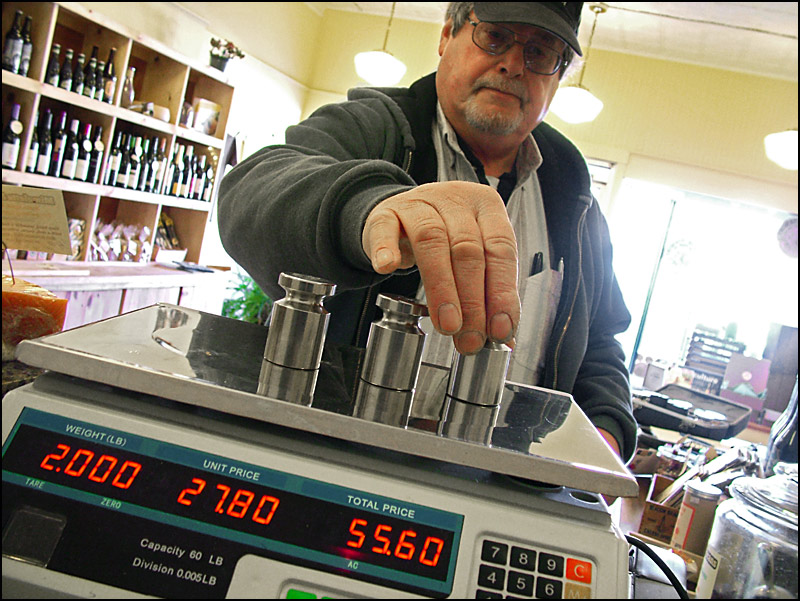 Robert Wiggin, sealer of weights and measures for 25 Midcoast municipalities, checks the accuracy of a scale at Eat More Cheese in Belfast. (Photo by Ethan Andrews)
Robert Wiggin, sealer of weights and measures for 25 Midcoast municipalities, checks the accuracy of a scale at Eat More Cheese in Belfast. (Photo by Ethan Andrews)
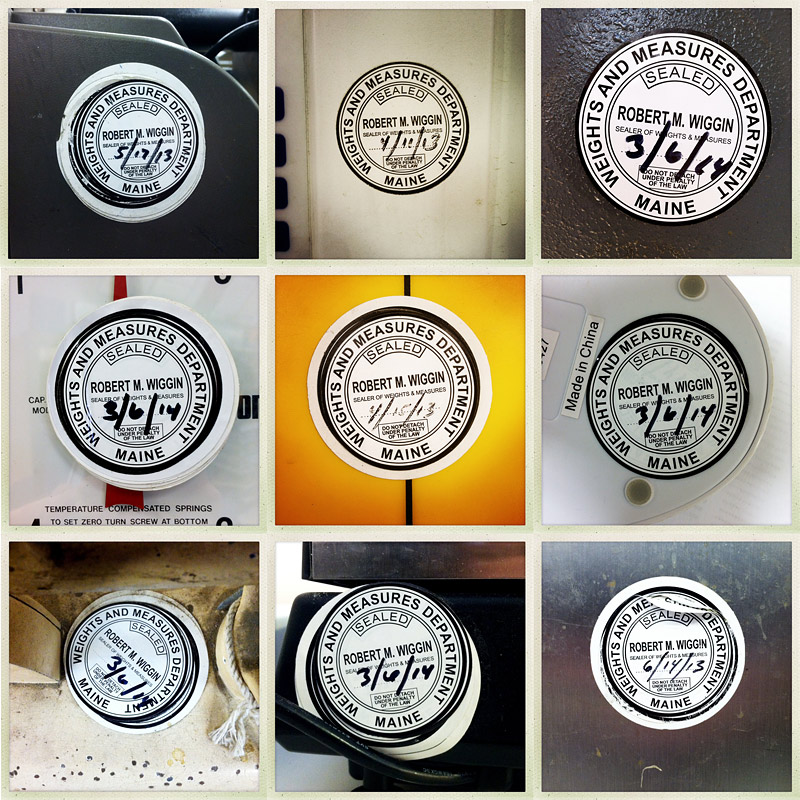 Just a few of the hundreds of stickers visible on scales and gas pumps across the Midcoast indicating that Robert Wiggin has checked them for accuracy. (Photos by Ethan Andrews)
Just a few of the hundreds of stickers visible on scales and gas pumps across the Midcoast indicating that Robert Wiggin has checked them for accuracy. (Photos by Ethan Andrews)
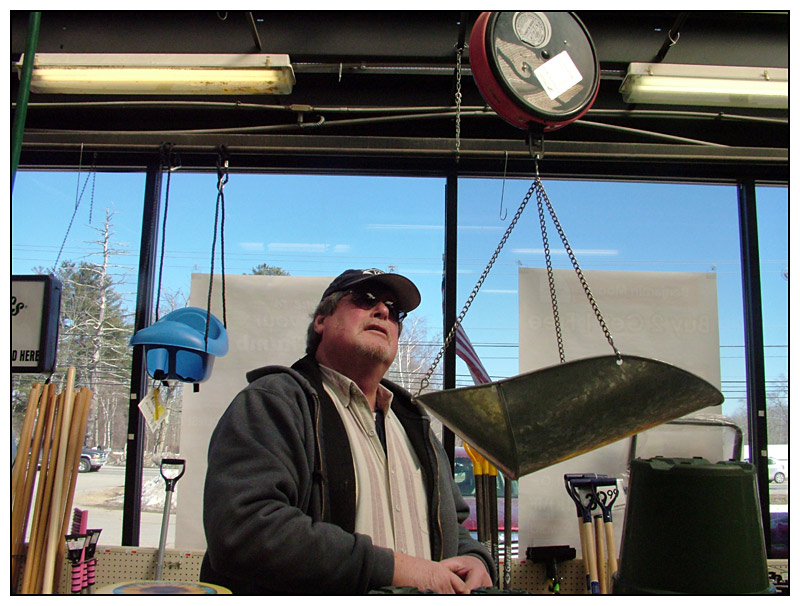 Wiggin checks the reading on a hanging scale at Aubuchon Hardware in Belfast. (Photo by Ethan Andrews)
Wiggin checks the reading on a hanging scale at Aubuchon Hardware in Belfast. (Photo by Ethan Andrews)
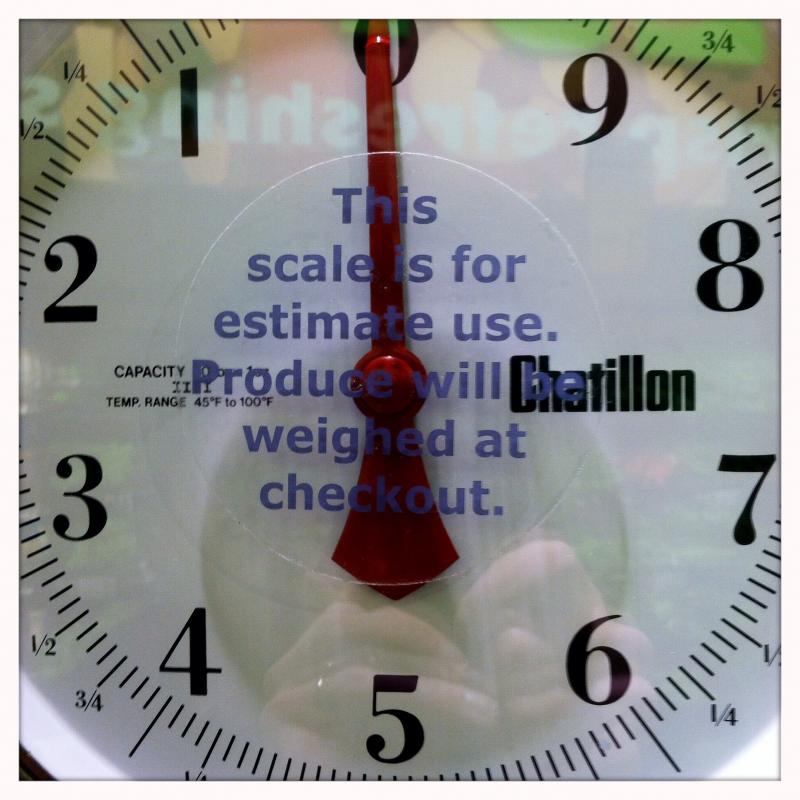 Some scales, including this one in the produce section of a supermarket, are not subject to inspection because they are for reference only, and not used to determine the final price. (Photo by Ethan Andrews)
Some scales, including this one in the produce section of a supermarket, are not subject to inspection because they are for reference only, and not used to determine the final price. (Photo by Ethan Andrews)
 A handwritten log of the towns Wiggin covers, annotated with the date of his most recent visit. (Photo by Ethan Andrews)
A handwritten log of the towns Wiggin covers, annotated with the date of his most recent visit. (Photo by Ethan Andrews)
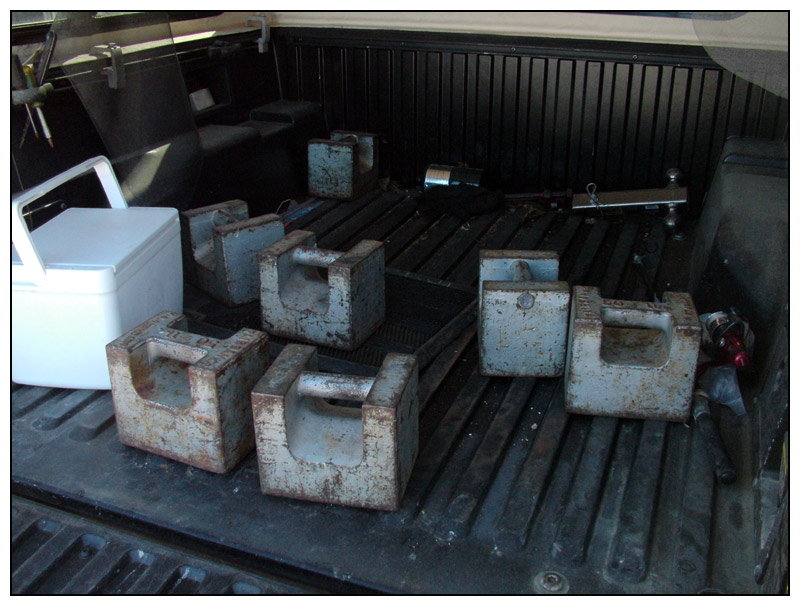 The bed of Wiggin’s pickup truck carries the bulk of the 450 pounds worth of assorted weights he uses to test local scales. Each of these weighs 50 pounds. (Photo by Ethan Andrews)
The bed of Wiggin’s pickup truck carries the bulk of the 450 pounds worth of assorted weights he uses to test local scales. Each of these weighs 50 pounds. (Photo by Ethan Andrews)
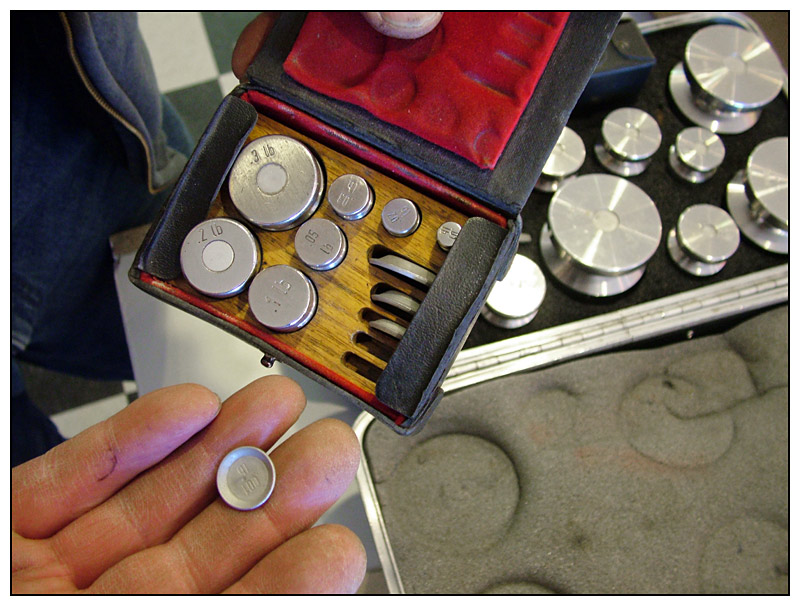 At the other end of the scale, a small set of weights allows for fine measurement. (Photo by Ethan Andrews)
At the other end of the scale, a small set of weights allows for fine measurement. (Photo by Ethan Andrews)
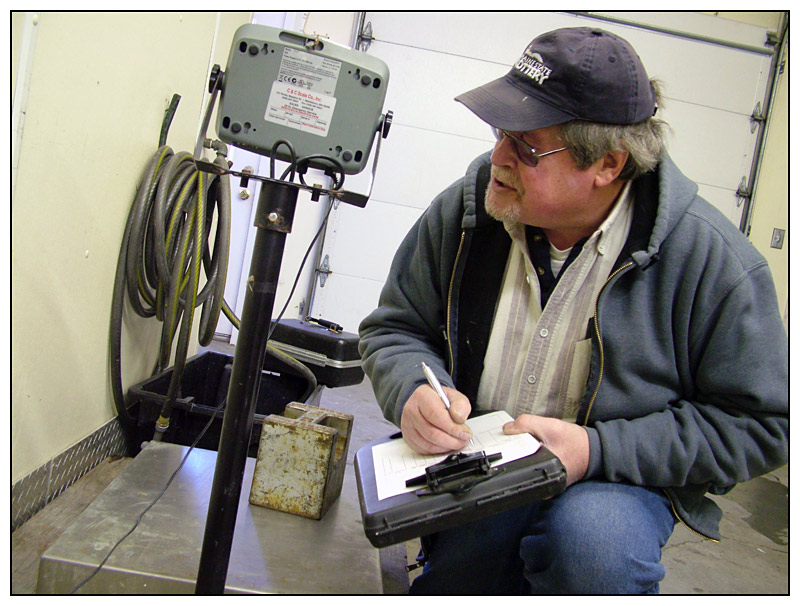 Wiggin checks the reading on a large scale at Maine Maritime Products in Belfast. On the scale bed is a single 50 pound weight. (Photo by Ethan Andrews)
Wiggin checks the reading on a large scale at Maine Maritime Products in Belfast. On the scale bed is a single 50 pound weight. (Photo by Ethan Andrews)
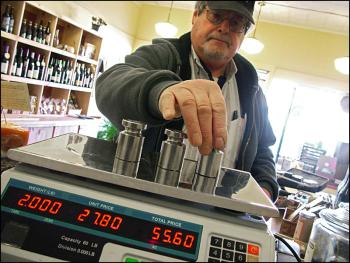 Robert Wiggin, sealer of weights and measures for 25 Midcoast municipalities, checks the accuracy of a scale at Eat More Cheese in Belfast. (Photo by Ethan Andrews)
Robert Wiggin, sealer of weights and measures for 25 Midcoast municipalities, checks the accuracy of a scale at Eat More Cheese in Belfast. (Photo by Ethan Andrews)
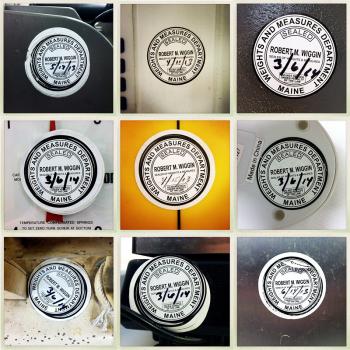 Just a few of the hundreds of stickers visible on scales and gas pumps across the Midcoast indicating that Robert Wiggin has checked them for accuracy. (Photos by Ethan Andrews)
Just a few of the hundreds of stickers visible on scales and gas pumps across the Midcoast indicating that Robert Wiggin has checked them for accuracy. (Photos by Ethan Andrews)
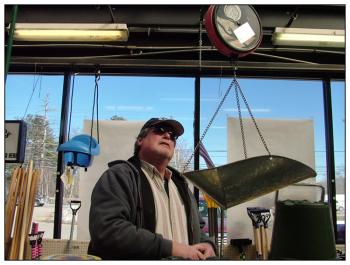 Wiggin checks the reading on a hanging scale at Aubuchon Hardware in Belfast. (Photo by Ethan Andrews)
Wiggin checks the reading on a hanging scale at Aubuchon Hardware in Belfast. (Photo by Ethan Andrews)
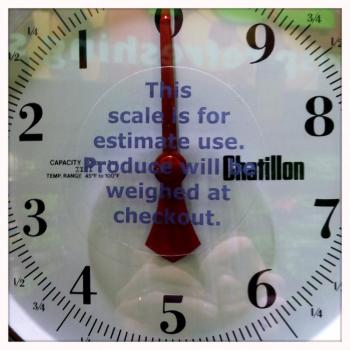 Some scales, including this one in the produce section of a supermarket, are not subject to inspection because they are for reference only, and not used to determine the final price. (Photo by Ethan Andrews)
Some scales, including this one in the produce section of a supermarket, are not subject to inspection because they are for reference only, and not used to determine the final price. (Photo by Ethan Andrews)
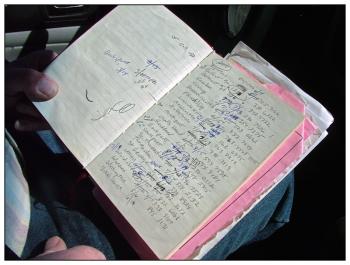 A handwritten log of the towns Wiggin covers, annotated with the date of his most recent visit. (Photo by Ethan Andrews)
A handwritten log of the towns Wiggin covers, annotated with the date of his most recent visit. (Photo by Ethan Andrews)
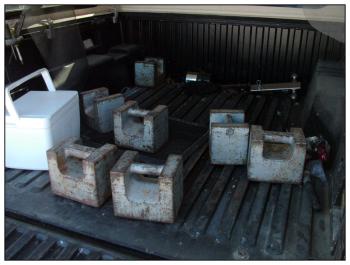 The bed of Wiggin’s pickup truck carries the bulk of the 450 pounds worth of assorted weights he uses to test local scales. Each of these weighs 50 pounds. (Photo by Ethan Andrews)
The bed of Wiggin’s pickup truck carries the bulk of the 450 pounds worth of assorted weights he uses to test local scales. Each of these weighs 50 pounds. (Photo by Ethan Andrews)
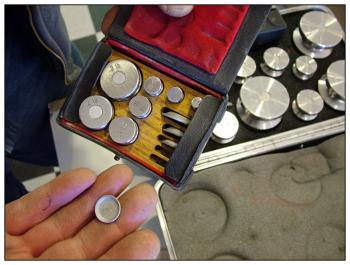 At the other end of the scale, a small set of weights allows for fine measurement. (Photo by Ethan Andrews)
At the other end of the scale, a small set of weights allows for fine measurement. (Photo by Ethan Andrews)
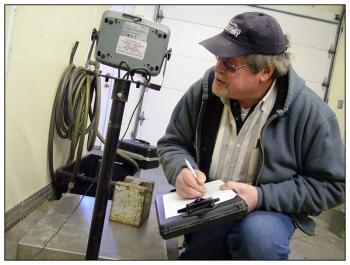 Wiggin checks the reading on a large scale at Maine Maritime Products in Belfast. On the scale bed is a single 50 pound weight. (Photo by Ethan Andrews)
Wiggin checks the reading on a large scale at Maine Maritime Products in Belfast. On the scale bed is a single 50 pound weight. (Photo by Ethan Andrews)
BELFAST - When you buy a gallon of gas, how do you know it’s really a gallon? And what about a pound of apples?
There’s no guarantee you’ll get what you pay for. But if you live in one of 25 towns in the Midcoast, Robert Wiggin is the next best thing. For seven months out of the year, the “sealer of weights and measures” spot checks every commercial scale and gas pump in a string of towns from Bucksport to Newcastle.
The good news is that most of them pass inspection, and those that don’t often simply need to be calibrated.
“Under. Over. Either way,” he said. “When I’m doing 30 scales, I usually find at least one. It doesn’t take much to throw it off.”
Wiggin lives in Rockland. He starts his annual rounds in March, working two or three days a week between trips to Vinalhaven where he works as a grocery meat manager. In total, he makes around 1,200 stops, hitting up lobster washes, supermarkets, lumber yards, farm stands, fly-by-night roadside seafood vendors and others that only a sealer of weights and measures would think of.
To spend a few hours with Wiggin is to be pregnant with a commercial scale. Suddenly they seem to be everywhere.
On a recent visit to Belfast, he drove slowly up Main Street in his silver pickup, scanning the storefronts. Aside from a handwritten ledger with the name of each town and the date of his last visit, he works from a combination of memory and arcane acquired knowledge.
“All the gas stations have banana scales,” he said.
His dog, Emma, a massive golden retriever, lounged in the back of the extended cab, occasionally emerging like a figurehead from between the two front seats.
Wiggin explained that when filling station convenience stores started selling bananas, they had to have scales to weigh them, but for most, that was the beginning and end of what they were used for.
Normally, he checks these amid the larger job of testing gas pumps — the process involves filling five gallon buckets at several different speeds and checking the known volume against the pump meter — but gasoline expands and contracts with the temperature and it was too cold in Belfast to get an accurate reading. Banana scales would have to wait.
Instead, he dropped in on a number of the city’s retail shops and bulk sellers.
Wiggin travels with 450 pounds of assorted weights, ranging from 50-pound, lunchbox-shaped dumbbells to a dime-sized aluminum disc that weighs about as much as a postage stamp.
The latter he never uses. Post Offices are regulated by the federal government, and the businesses Wiggin inspects don’t sell in quantities small enough to warrant its use.
For most retail stores, he relies upon his 35-pound “mass standards” weight set. The molded plastic case includes solid metal cylinders sized from five pound to a half pound.
At Home Supply Center hardware, he opened it up next to an ancient-looking balance scale used for loose nails, put several of the shiny cylinders into the pan of the scale, then checked the reading on the dial.
He repeated this process with a hanging scale used for feed, and again for a small platform scale used for the store’s UPS drop-off service.
All of them passed, as did deli scales up the street at Eat More Cheese and at the Chocolate Drop Candy Shop, a hanging scale for loose bird and hamster food at Family Pet Center and large platform scales for weighing bulk seafood at Maine Maritime Products.
Wiggin marks an accurate scale with a circular sticker bearing his seal and a handwritten date. The new sticker goes over the old one, often leaving the edges of a half-dozen previous stickers visible in some measure.
Wiggin’s weights, too, are subject to inspection. Every November he turns them in to the state and collects them again in March with documentation that he keeps, along with other papers, jammed into the passenger seat sun visor in his truck.
“Some people, if I flunk their scales, they’ll want to see that, so I carry it around,” he said.
In a shed outside Ellsworth Building Supply, Wiggin leaned over to apply his sticker to a scale for weighing propane tanks did a double take.
“Someone playing games,” he said. The date had long expired and the name of the seal was not Wiggin’s but that of his predecessor, Neil Gibbs.
Gibbs was a sealer of weights and measures in the Midcoast for 42 years. As a long time grocery store meat cutter and former owner of Jess’s Market in Rockland, Wiggin knew him from across the counter.
“I always said, ‘If you ever want to get rid of your job, give me a call,’” he said.
Gibbs held onto the job until he was 82, Wiggin said, but eventually he did call. At the time there were 12 towns, but Wiggin has picked up that amount again as other sealers have quit or retired.
Sealers of weights and measures work under contract with the state and are appointed by municipal officials on a town-by-town basis. Wiggin works alone and on his own schedule. The state reimburses him for testing gas pumps. Businesses that have scales pay him directly, $5 for small scales and $10 for anything between 100 and 1,000 pounds, he said.
At several stops he advised business owners on the importance of keeping their scales level, and how do a rough comparative check using a known weight, like a one pound bag of sand.
“Put one thing on one scale, put it on the other scale, see if it’s accurate,” he said.
At Perry’s Nut House, he demonstrated the general idea as he spoke, grabbing a souvenir snow globe off a nearby shelf and setting it on a scale usually reserved for fudge. Owner George Darling joked about resting a thumb on the scale bed, then mused out loud that he might get new ones in the next year or two.
“That’s good,” Wiggin said. “I’ll be back.”
Ethan Andrews can be reached at news@penbaypilot.com
Event Date
Address
United States

